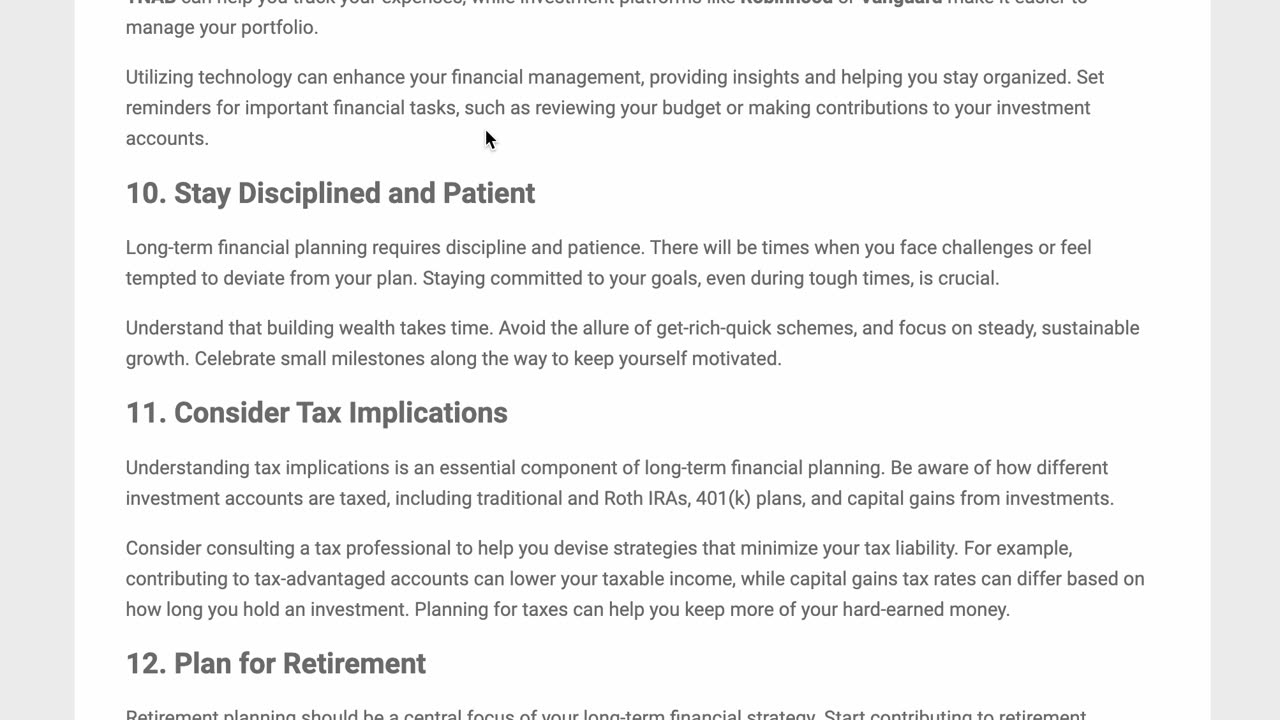Premium Only Content

Effective Strategies for Long-Term Financial Planning (Your Roadmap to Financial Security)
Long-term financial planning is crucial for securing your future and achieving your life goals. Whether you're saving for retirement, planning for your children's education, or aiming to buy a home, having a solid financial plan in place can make all the difference. Here’s how to build an effective long-term financial strategy that aligns with your aspirations.
1. Set Clear Financial Goals
The first step in any financial plan is defining your goals. Start by identifying what you want to achieve in the short, medium, and long term. Short-term goals might include saving for a vacation or a new car, while medium-term goals could involve funding your children's education or buying a home. Long-term goals often revolve around retirement savings.
Make your goals SMART: Specific, Measurable, Achievable, Relevant, and Time-bound. For example, instead of saying, “I want to save for retirement,” specify, “I want to save $1 million for retirement by the age of 65.” This clarity will help you create a focused plan.
2. Create a Comprehensive Budget
A budget serves as the foundation of your financial plan. It allows you to understand your income, expenses, and savings potential. Begin by tracking your monthly income and categorizing your expenses into needs (like housing and groceries) and wants (like dining out and entertainment).
Once you have a clear picture, set limits for each category. Ensure you allocate a portion of your income toward your savings goals. Sticking to your budget is essential for building a solid financial future.
3. Build an Emergency Fund
Life is unpredictable, and having an emergency fund can save you from financial distress. Aim to save at least three to six months’ worth of living expenses. This fund acts as a safety net, allowing you to handle unexpected expenses—like medical bills or car repairs—without derailing your long-term financial goals.
Keep your emergency fund in a high-yield savings account to earn some interest while keeping it easily accessible. This way, your money grows while remaining liquid.
4. Understand Your Debt
Debt can be a significant barrier to achieving your financial goals. Begin by assessing your current debts—credit cards, student loans, mortgages, etc. Make a list of each debt, including the balance, interest rate, and monthly payment.
Prioritize paying off high-interest debt first, as it can quickly accumulate and hinder your progress. Consider strategies like the avalanche method (paying off the highest interest debt first) or the snowball method (focusing on the smallest debt first). Developing a clear strategy for managing your debt is crucial for your long-term financial health.
5. Invest for the Future
Investing is one of the most effective ways to grow your wealth over time. Start by contributing to retirement accounts, such as a 401(k) or IRA, especially if your employer offers a matching contribution. This is essentially free money and a great way to kickstart your retirement savings.
Diversify your investments across various asset classes—stocks, bonds, and real estate—to mitigate risk. Consider your risk tolerance and time horizon when selecting investments. If you're younger and have more time before retirement, you might opt for riskier investments with higher potential returns.
6. Regularly Review and Adjust Your Plan
Financial planning isn’t a one-time task; it requires regular reviews and adjustments. Schedule periodic check-ins—at least once a year—to assess your financial situation and make necessary changes.
During these reviews, evaluate your progress toward your goals, adjust your budget as needed, and ensure your investment strategy remains aligned with your risk tolerance and market conditions. Life changes, such as a new job, marriage, or the birth of a child, may necessitate adjustments to your plan.
7. Seek Professional Guidance
If managing your finances feels overwhelming, consider seeking help from a financial advisor. A professional can offer personalized advice, help you create a comprehensive financial plan, and guide you through investment decisions.
When choosing an advisor, look for someone with a fiduciary responsibility, meaning they are obligated to act in your best interest. While there may be costs associated with hiring a professional, the potential benefits can far outweigh the expenses.
8. Educate Yourself
Knowledge is a powerful tool in financial planning. Take the time to educate yourself about personal finance, investing, and wealth management. There are countless resources available, from books and podcasts to online courses and webinars.
Stay informed about economic trends, tax laws, and changes in the investment landscape. The more you know, the better equipped you'll be to make informed decisions about your finances.
9. Make Use of Technology
In today’s digital age, numerous tools and apps can simplify your financial planning process. Budgeting apps like Mint or YNAB can help you track your expenses, while investment platforms like Robinhood or Vanguard make it easier to manage your portfolio.
Utilizing technology can enhance your financial management, providing insights and helping you stay organized. Set reminders for important financial tasks, such as reviewing your budget or making contributions to your investment accounts.
10. Stay Disciplined and Patient
Long-term financial planning requires discipline and patience. There will be times when you face challenges or feel tempted to deviate from your plan. Staying committed to your goals, even during tough times, is crucial.
Understand that building wealth takes time. Avoid the allure of get-rich-quick schemes, and focus on steady, sustainable growth. Celebrate small milestones along the way to keep yourself motivated.
11. Consider Tax Implications
Understanding tax implications is an essential component of long-term financial planning. Be aware of how different investment accounts are taxed, including traditional and Roth IRAs, 401(k) plans, and capital gains from investments.
Consider consulting a tax professional to help you devise strategies that minimize your tax liability. For example, contributing to tax-advantaged accounts can lower your taxable income, while capital gains tax rates can differ based on how long you hold an investment. Planning for taxes can help you keep more of your hard-earned money.
12. Plan for Retirement
Retirement planning should be a central focus of your long-term financial strategy. Start contributing to retirement accounts as early as possible to take advantage of compound interest. Even small contributions can grow significantly over time.
Determine your retirement needs by considering factors such as your desired lifestyle, healthcare costs, and potential income sources like Social Security. Aim to save enough to maintain your current lifestyle during retirement, which often means targeting around 70-80% of your pre-retirement income.
13. Insurance as a Safety Net
Insurance is a critical element of financial planning that can protect your assets and provide peace of mind. Evaluate your insurance needs, including health, auto, home, and life insurance.
Having adequate coverage can prevent financial setbacks caused by unexpected events, such as accidents or illnesses. Consider life insurance if you have dependents; it ensures their financial security in case something happens to you.
14. Create a Will and Estate Plan
Estate planning is an often-overlooked aspect of financial planning. Having a will ensures your assets are distributed according to your wishes after your death. Additionally, consider setting up trusts, powers of attorney, and healthcare proxies to provide clarity and guidance for your loved ones.
Estate planning is not just for the wealthy; it’s an essential process for everyone. It ensures your wishes are honored and can help prevent family disputes during difficult times.
15. Embrace a Growth Mindset
Adopting a growth mindset towards your financial journey can have a significant impact on your success. View challenges as opportunities to learn and improve rather than as setbacks.
Embrace mistakes as part of the learning process, whether in investing, budgeting, or financial decision-making. Continuously seek improvement and stay open to adjusting your strategies as new information and experiences arise.
Read the full blog post here https://www.gerardyadgg.com/2024/10/effective-strategies-for-long-term.html
-
 LIVE
LIVE
Sgtfinesse
1 hour ago💥Sunday Morning Hunt for Featherweight Artifact | New World PVP Server: Sclavia
545 watching -
 11:25
11:25
Film Threat
17 hours agoLET'S DISCUSS THE 2025 OSCAR NOMINATIONS | Film Threat News
6.44K3 -
 13:07
13:07
DEADBUGsays
2 hours agoThe Southport Massacre, The Great British Cover-Up
11.2K8 -
 25:26
25:26
hickok45
5 hours agoSunday Shoot-a-Round # 265
8.2K23 -
 30:55
30:55
Tundra Tactical
16 hours ago $14.74 earnedFaith, Family, Gun Rights : Tundra Tactical Interviews Erich Pratt Vice President Of GOA
73.4K17 -
 24:08
24:08
MYLUNCHBREAK CHANNEL PAGE
1 day agoUnder The Necropolis - Pt 4
219K62 -
 1:26:44
1:26:44
Tactical Advisor
1 day agoTrump Starting Strong/Shot Show Recap | Vault Room Live Stream 015
115K9 -
 49:13
49:13
SGT Report
1 day agoGILDED CAGE: A.I. PRODUCED MRNA VACCINES & THE ROAD TO HELL -- Sam Anthony
65.2K395 -
 17:00
17:00
BIG NEM
15 hours agoI Spent 10 Years Making a Movie About a 40 Year Old VIRGIN
5.23K -
 17:01
17:01
RealitySurvival
11 hours agoRussia's Anti-Satellite Weapon Could Disable Your Commuter Car!
3.97K